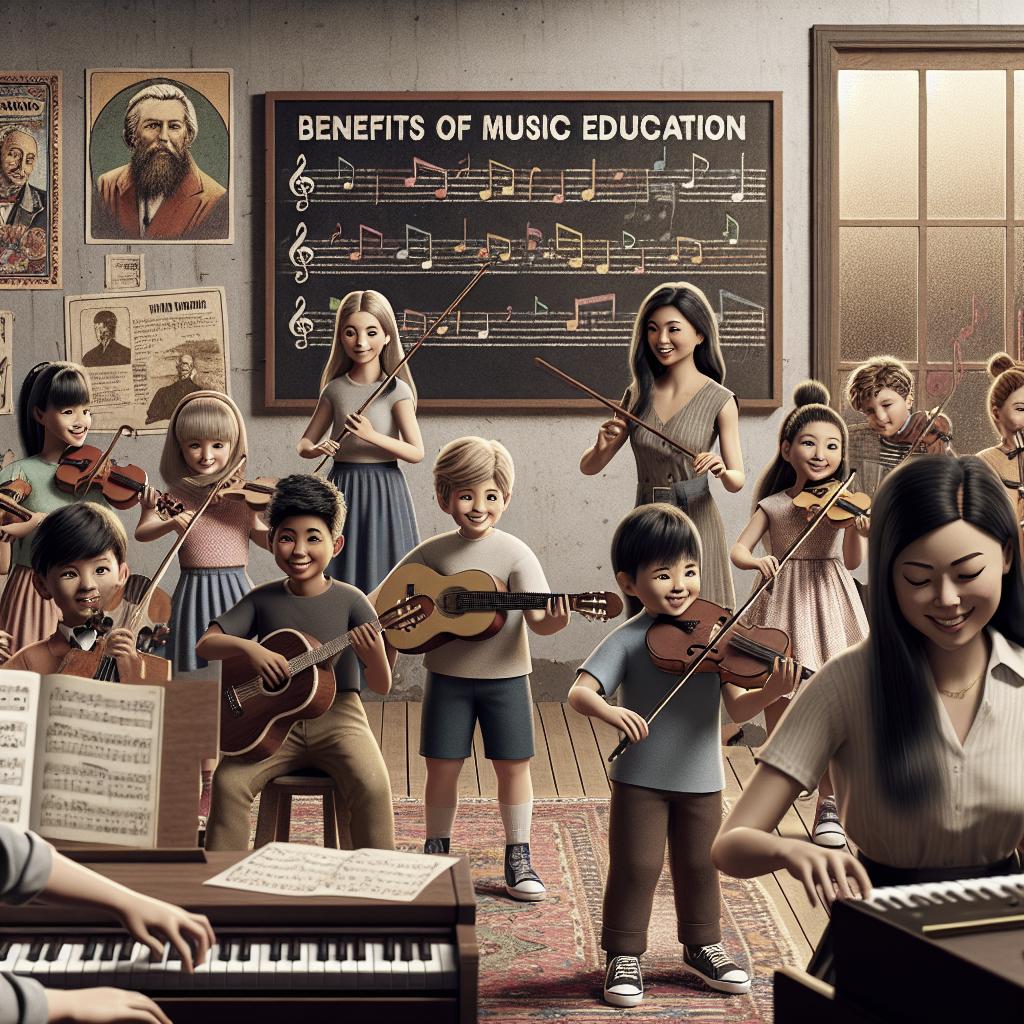“`html
Benefits of Music Education for Kids
Music education offers a multitude of benefits for children, touching on aspects of their cognitive, emotional, and social development. From the early days of infancy to the growing years of adolescence, music shapes and refines essential skills, impacting brain development, behavior, and life’s overall rhythm. Research consistently supports the positive impact of music education on children’s brains. This blog post explores various facets, from the effect of music on different age groups to recommended programs and related reading materials. Join us as we delve into how music education can create a strong foundation for a lifelong appreciation and love for music for your child.
How music affects your child’s brain
The impact of music on a child’s brain is profound and multifaceted. Engaging with music activates various brain areas, enhancing spatial awareness, memory, and language skills. It encourages bilateral brain activation, which is crucial for multitasking and higher cognitive functions. Studies have shown that children who engage with music, whether by listening, singing or playing an instrument, experience elevated levels of brain activity that correlate with increased intelligence and creativity.
Music acts as a bridge that strengthens the connections between the brain’s left and right hemispheres. This connection fosters enhanced emotional intelligence and empathy, as the child learns to interpret and respond to music’s emotional nuances. Moreover, music education can serve as a stress reliever, allowing children to express themselves and process emotions healthily. Essentially, music creates a dynamic and enriched brain environment conducive to learning and growth.
Does research support how music education affects the brain?
Numerous studies confirm the positive effects of music education on brain development. Research conducted by neuroscientists has shown that children who receive music education have improved neural processing capabilities. For instance, learning to play an instrument helps develop critical thinking and problem-solving skills, directly influencing academic performance. Moreover, children exposed to music consistently score higher on tests of spatial-temporal skills, which are essential for success in subjects like math and science.
Longitudinal studies also suggest that children involved in regular musical training exhibit greater verbal memory and executive function skills than their peers. The cognitive benefits of music are enduring, providing advantages that persist well into adulthood. These insights into the brain’s adaptation to music exemplify the essential role of music education in nurturing a child’s cognitive abilities comprehensively.
Why is learning music important for your child’s development?
Music education is critical to holistic child development. It cultivates discipline, patience, and resilience, as acquiring musical skills requires practice and dedication. These attributes are transferable to other areas of life, including academic pursuits and interpersonal relationships. Children who engage in music also experience enhanced self-esteem and confidence, benefiting from the encouragement and support of teachers and peers.
In addition to cognitive development, music education promotes social and emotional growth. It offers a unique platform for children to explore teamwork and collaboration, especially when participating in group performances or ensembles. This social interaction through music helps children develop communication and leadership skills, laying the groundwork for well-rounded personal development.
Does music affect children’s behavior?
Music profoundly influences children’s behavior. It can help regulate emotions, manage anxiety, and improve mood. The rhythmic and repetitive nature of music offers a structured outlet for energy and emotions, reducing the likelihood of behavioral problems. Music’s universality makes it an effective tool for teaching empathy, patience, and respect for cultural differences.
In educational settings, integrating music into the curriculum can enhance focus and attention span. Children learn the value of listening, following instructions, and taking turns. These behavioral benefits extend beyond the classroom, contributing to a positive learning environment and fostering a child’s growth into a well-behaved individual.
Babies, toddlers, and music: Ages 0–2
For infants and toddlers, music serves as a cornerstone of early development. Exposing babies to music establishes connections in the brain that strengthen auditory, emotional, and motor pathways. Rhymes, songs, and simple instruments encourage babies to engage with and respond to auditory stimuli, paving the way for language development and communication skills.
Interactive music activities for toddlers, such as clapping, dancing, or playing simple instruments, build coordination and motor skills. Moreover, these activities promote emotional bonding as young children connect with caregivers through shared musical experiences. Therefore, nurturing an early appreciation for music sets a foundation for cognitive and social growth during these formative years.
Music and early childhood development: Ages 2–6
During early childhood, ages two to six, music education has an instrumental role in fostering creativity and imagination. At this stage, children become more adept at expressing themselves through music, whether by singing or experimenting with musical instruments. Music activities, such as group singing or rhythm games, promote communication skills and vocabulary development.
Furthermore, music encourages physical development through movement and dance. Coordinating movements to music enhances gross motor skills, balance, and spatial awareness. As children experiment with different musical elements, they also learn to collaborate with peers, developing social skills and a sense of cooperation through teamwork.
How children benefit from music education: Ages 7–11
For school-aged children, ages seven to eleven, music education becomes a tool for enhancing academic and social skills. At this stage, children often begin formal music instruction, learning to play instruments and understanding music theory. These activities stimulate brain regions related to planning, organization, and memory, aiding academic success.
Additionally, being part of a choir or orchestra teaches children the importance of commitment, practice, and perseverance. These skills contribute to stronger confidence and self-discipline, qualities essential for academic and personal achievements. In a social context, participating in group music activities fosters friendships and a sense of community, crucial for personal development during these years.
The effects of music on the adolescent brain: Ages 12 and up
As children transition into adolescence, music education becomes an outlet for self-expression and identity exploration. For adolescents, music is not just an academic pursuit but often a medium to understand and interact with the world around them. Learning and performing music enhances emotion regulation and stress management, crucial skills during these formative years.
Engaging in music, whether through individual practice or group performance, develops advanced cognitive skills such as abstract reasoning and critical thinking. Moreover, music provides a platform for cultural exposure and appreciation of diversity, fostering tolerance and empathy. The skills acquired through music education are invaluable in shaping adolescents into thoughtful and well-rounded individuals.
Recommended Music Program: Little Wing
The Little Wing program is designed for young children to ignite their passion for music in a fun, interactive environment. With themes and activities tailored for toddlers, Little Wing capitalizes on early childhood curiosity and exploration to introduce basic music concepts. By incorporating play with musical engagement, the program builds foundational skills necessary for further musical education.
Supporting brain development and social growth, the Little Wing program emphasizes sensory engagement and interactive learning. Children benefit from improved listening skills and creativity as they explore music in a structured yet flexible setting, ultimately laying the groundwork for a lifelong enjoyment of music.
Recommended Music Program: Rock 101
Rock 101 is a program aimed at school-aged children who are ready to take their passion for music to the next level. In this program, students learn to play various songs through a combination of one-on-one lessons and group rehearsals. This approach ensures they gain technical skills and experience the excitement of performing as part of a band.
This program teaches essential musical skills such as chord progressions, tempo, and rhythm while fostering teamwork, communication, and confidence. Rock 101 provides an engaging, supportive environment for students to explore their musical interests and perform with their peers, which boosts their self-esteem and encourages continued music education.
Recommended Music Program: Performance Program
The Performance Program is designed for older children and teenagers ready to hone their skills in a more intensive music setting. Focused on collaborative learning, the program culminates in live performances, providing students with invaluable experience that goes beyond the classroom. It promotes both individual growth and collective achievement.
Throughout the program, students refine their technical abilities, develop stage presence, and learn the intricacies of band dynamics. This combination of skill enhancement and live performance opportunity nurtures students’ passion for music and prepares them for future artistic endeavors. They learn valuable life skills such as responsibility, resilience, and overcoming challenges.
Related Articles
- The Role of Music in Developing Emotional Intelligence in Children
- Top Instruments for Children: Finding the Perfect Match
- Music and Academic Performance: What Recent Studies Have to Say
- The Connection Between Music and Math: Strengthening Logical Skills Through Rhythm
Music education and teaching kids to love music
Inspiring a love for music is one of the most enduring gifts music education can offer. By fostering a child’s innate curiosity and appreciation for music, educators and parents can cultivate an environment that encourages lifelong learning and cultural engagement. Whether through experimentation, performance, or passive listening, exposing children to various music genres fosters openness and understanding.
The key to teaching kids to love music lies in making it accessible and enjoyable. Encouraging participation in music activities and performance builds confidence and skill while developing a general sense of joy and satisfaction. Through music education, children learn the significance of tradition and innovation, developing a lifelong respect and passion for musical exploration.
Celebrate National STEM Day with These Fun Activities
National STEM Day presents an opportunity to integrate music into science, technology, engineering, and mathematics exploration. Music education can complement STEM learning by stimulating the same creative problem-solving and analytical thinking required in these disciplines. For instance, exploring the physics of sound through musical instruments or coding to create musical compositions can illuminate the intersection between music and science.
Engaging in music-related STEM activities encourages students to think about music from a new perspective, reinforcing interdisciplinary learning. This holistic approach empowers students to connect with various fields, highlighting the relevance of music in broader educational contexts and encouraging curiosity and innovation.
The 7 Key Elements of All Music
At its core, music is composed of seven key elements: melody, harmony, rhythm, texture, form, timbre, and dynamics. Understanding these elements is essential for grasping the complexity and beauty of music. Each element contributes uniquely to a musical piece, affecting how it’s perceived and experienced by listeners.
Teaching children the fundamentals of these elements lays the groundwork for musical comprehension. Through practical application and active listening, students learn to identify, analyze, and appreciate these elements, gaining a deeper understanding of how music communicates emotions and stories.
Creating a Multicultural Music Classroom Experience in Increasingly Diverse Schools
In diverse educational settings, creating a multicultural music classroom experience is crucial for fostering inclusion and appreciation of global cultures. Incorporating music from various traditions enables students to understand and value cultural differences and similarities, promoting a sense of global citizenship.
Educators can utilize instruments, songs, and musical styles from around the world to create an inclusive curriculum reflecting the students’ diverse backgrounds. This approach enriches the music learning experience and encourages students to respect and celebrate cultural diversity through a shared appreciation of music.
Latin Rock: Its History and Future
Latin Rock, a vibrant genre combining the rhythms and instruments of Latin music with rock, has a rich history shaped by cultural fusion and artistic innovation. It emerged as a powerful voice for expression and identity, bridging traditional Latin sounds with contemporary rock influences.
The future of Latin Rock is promising, as the genre continues to evolve, reflecting changing cultural dynamics and exploring new musical directions. As artists experiment with diverse soundscapes, Latin Rock serves as a testament to creativity and resilience, inspiring new generations of musicians and listeners alike.
Celebrate Hispanic Heritage Month with Latin Rock Festivals
Hispanic Heritage Month is an ideal time to explore Latin Rock’s impact and legacy. Latin Rock festivals celebrate cultural diversity and musical innovation, offering a platform for artists to connect with audiences and share their heritage through music. These events honor Latin Rock’s history while providing a space for emerging musicians to showcase their talents.
Attending Latin Rock festivals can educate audiences about the cultural influences that shape the music, fostering an appreciation of music as both a personal and communal experience. These festivals underscore the importance of honoring heritage while embracing new artistic expressions.
Future Prospects
| Age Group | Music Benefits | Recommended Programs | Additional Topics |
|---|---|---|---|
| 0-2 | Brain development, emotional bonding | Little Wing | Babies, toddlers, and music |
| 2-6 | Motor skills, creativity, social growth | Little Wing | Early childhood development |
| 7-11 | Academic enhancement, social skills | Rock 101 | Music education benefits |
| 12+ | Self-expression, cultural appreciation | Performance Program | Adolescent development |
“` This HTML blog post delves into the diverse benefits of music education for children by explaining its influence on cognitive, emotional, and social development across various age groups. It discusses research findings, recommended programs and offers related reading topics. Additionally, it provides an overview of the cultural context of music education within broader celebrations and educational frameworks. At the end, a summary table highlights the essentials discussed in the article.


